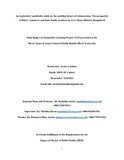| dc.contributor.advisor | Barua, Mrittika | |
| dc.contributor.author | Lastima, Jorina | |
| dc.date.accessioned | 2023-07-12T10:23:33Z | |
| dc.date.available | 2023-07-12T10:23:33Z | |
| dc.date.copyright | 2023 | |
| dc.date.issued | 2023 | |
| dc.identifier.other | ID 22167023 | |
| dc.identifier.uri | http://hdl.handle.net/10361/18772 | |
| dc.description | This project report is submitted in partial fulfillment of the requirements for the degree of Master of Public Health (MPH), 2023. | en_US |
| dc.description | Cataloged from the PDF version of the project report. | |
| dc.description | Includes bibliographical references (pages 22-25). | |
| dc.description.abstract | Introduction: Volunteers have a vital role in the community. Their motivation to volunteer can
influence other people to change their behavior. Especially in the time of the COVID-19
pandemic, volunteers assisted institutions to help deliver service. Similarly, the BRAC CST
project is dealing with COVID-19 in 6 project sites in Cox’s Bazar, Bangladesh with the aid of
volunteers. BRAC volunteers are disseminating COVID-19 messages and distributing masks in
the community. The volunteers and their families have the relevant information to determine
their perception, motivation, and experiences on volunteerism. This study aimed to understand
enabling factors of volunteerism from BRAC volunteers and their family members' perspectives
in Cox’s Bazar, Bangladesh.
Method: The study design used is a qualitative study. An in-depth interview was conducted
with 10 BRAC volunteers and 4 family members in 3 BRAC CST project sites located in Cox’s
Bazar, Bangladesh. The purposive sampling method was used to select the samples. A
semi-structured IDI guideline was developed along with a consent form. IDIs were recorded,
transcribed, translated, coded, and analyzed thematically. Clustering and comparing were done
by using a data matrix and the results were summarized. Data triangulation was done to verify
the responses from the volunteers and family members. Ethical approval from BRAC University
James P Grant School of Public Health Institutional Review Board was obtained. The study
purpose, risks, benefits, and right to refuse and withdraw from the study were explained to the
participants. Anonymity and confidentiality were maintained during the entire time of the study.
o Findings: The study discovered that enabling factors on volunteerism contribute to volunteers’
positive experience in volunteer work. The volunteers' and family members’ perception of
volunteerism was that it is noble work to do. Volunteers serve the people willing to improve their
health which people find respectable. Representing a respectable institution such as BRAC gave
the volunteers a sense of pride. Volunteers along with their family members enjoy volunteering
activities as they experienced good interactions with the people. Gaining knowledge on
COVID-19 prevention benefited the volunteers as well as their families as it enhanced their
health practices. Volunteers also developed their communication skills in dealing with many
people. The family supported and encouraged volunteers in joining and doing volunteer work.
They are proud of their family member as the volunteer is doing a good deed for others. The
supervisors were also supportive of the volunteer’s time in taking leaves for their schoolwork.
Recognition in the community is also experienced by the volunteers. People’s participation
facilitated the discussion that helped the volunteer convey COVID-19 messages in the
community.
Conclusion: This study concluded that there were different factors of volunteerism. Each one
was interconnected with the other that making volunteers motivated to do volunteering. Factors
discovered where volunteer work is perceived as an honorable act, being proud to be part of a
respectable institution, enjoying volunteering, experiencing benefits, acceptability, and support
from the family, institution, and the community. These enabling factors identified made volunteer
work on COVID-19 awareness feasible in Cox’s Bazar, Bangladesh. | en_US |
| dc.description.statementofresponsibility | Jorina Lastima | |
| dc.format.extent | 52 pages | |
| dc.language.iso | en | en_US |
| dc.publisher | Brac University | en_US |
| dc.rights | Brac University project reports are protected by copyright. They may be viewed from this source for any purpose, but reproduction or distribution in any format is prohibited without written permission. | |
| dc.subject | Volunteers | en_US |
| dc.subject | Family | en_US |
| dc.subject | Perception | en_US |
| dc.subject | Motivation | en_US |
| dc.subject | Experience | en_US |
| dc.subject | Covid-19 | en_US |
| dc.subject | Bangladesh | en_US |
| dc.subject.lcsh | Covid-19 (Disease) | |
| dc.subject.lcsh | Non-government organizations | |
| dc.title | An exploratory qualitative study on the enabling factors of volunteerism: the perspective of BRAC volunteers and their family members in Cox’s Bazar District, Bangladesh | en_US |
| dc.type | Project report | en_US |
| dc.contributor.department | James P Grant School of Public Health, Brac University | |
| dc.description.degree | M. Public Health | |

